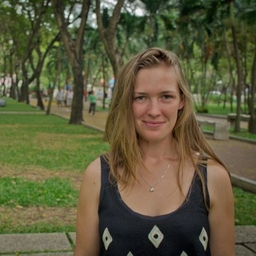
Rebekah White
Journalist and Editor at Freelance
Contributing Writer at New Zealand Geographic
Journalist & editor from New Zealand / contributing writer @NZGeographic / I go outside whenever I can / @rebekahwhite.bsky.social
Articles
-
2 months ago |
science.org | Christie Wilcox |Sarah Crespi |Rebekah White
Today’s Deep Dive delves into how human conflict intersects with ecology. But first, catch up on the latest science news, including the remarkable thing a microbe does under pressure and an unexpected regulator of pain. Anthropology | News from Science ‘Uniquely human’ language capacity found in bonobos Humans can combine words to create new meanings—an ability that gives language its expressive power and sets it apart from the communication of other animals.
-
2 months ago |
science.org | Rebekah White
When Marilyn Ezzy Ashcraft, mayor of Alameda, California, scrolled through The New York Times on a Saturday morning in April 2024, a story about a controversial experiment caught her eye. Researchers from Washington state were trialing a machine that looked like a big snow cannon, which they hoped could one day be used to brighten clouds to reflect more of the Sun’s rays. They’d been spraying tiny salt particles into the air over the San Francisco Bay.
-
2 months ago |
science.org | Sarah Crespi |Rebekah White
First up on the podcast, climate engineers face tough conversations with the public when proposing plans to test new technologies. Freelance science journalist Rebekah White joins host Sarah Crespi to discuss the questions people have about these experiments and how researchers can get collaboration and buy-in for testing ideas such as changing the atmosphere to reflect more sunlight or altering the ocean to suck up more carbon dioxide.
-
Nov 21, 2024 |
mdpi.com | Rebekah White |Michael Kluger |David Iannitti |Malcolm M. Bilimoria
All articles published by MDPI are made immediately available worldwide under an open access license. No special permission is required to reuse all or part of the article published by MDPI, including figures and tables. For articles published under an open access Creative Common CC BY license, any part of the article may be reused without permission provided that the original article is clearly cited. For more information, please refer to https://www.mdpi.com/openaccess.
-
Sep 17, 2024 |
theguardian.com | Rebekah White
In the mid-1970s, seabird researcher Rob Barrett set out in a rubber boat to survey one of Norway’s largest seabird colonies. Equipped with a camera and a pair of binoculars, he planned to photograph the Syltefjord colony, in the far north of the country, then, back on land, develop the photos and fit them together to create a panorama. After that, he would count the birds. As the boat drew closer to the cliffs, the gulls’ chattering increased to an overwhelming level. So did the smell.
Try JournoFinder For Free
Search and contact over 1M+ journalist profiles, browse 100M+ articles, and unlock powerful PR tools.
Start Your 7-Day Free Trial →Coverage map
X (formerly Twitter)
- Followers
- 3K
- Tweets
- 17K
- DMs Open
- Yes

After years of following @TaiwanBirding, I'm finally going to Taiwan. I'll only be in Taipei but hope I still get to see some cool guys like this one.

NOW is the time. Taiwan Thrushes (白頭鶇) are easiest to see in January…and maybe February. https://t.co/qxpEzslBRw

RT @ColumbiaJournMA: For @ScienceMagazine, @ColumbiaJournMA alum @RebekahWh (MA Science '23) reports that geoengineering could be crucial i…

Some new climate technologies are controversial, but they could also be useful; we should talk about it! It's not a matter of convincing people; it's a matter of being in dialogue. Sounds woolly, but here we unpack what this involves: https://t.co/ABRHIebfZM